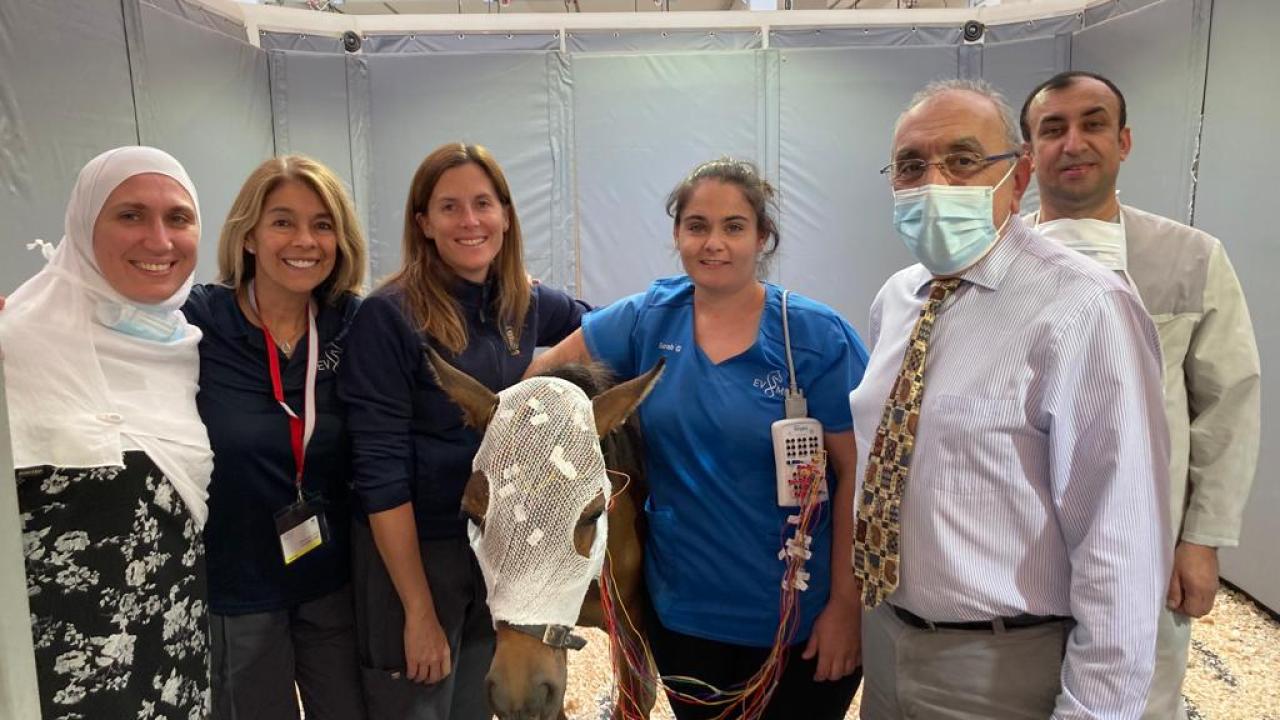
Equine Research Highlights Relation Between an Epileptic Syndrome in Foals and Infants
Veterinary medicine continues to find commonalities among conditions that affect animals and humans. This week, Dr. Monica Aleman presented an overview at the Platinum Summit in San Antonio of Juvenile Idiopathic Epilepsy (JIE) in Egyptian Arabian foals—an epileptic syndrome similar to one found in infants.
As the Dr. Terry Holliday Equine and Comparative Neurology Presidential Chair, Aleman is renowned globally for her clinical and research expertise in equine neurology. She spent three weeks this past summer collaborating with colleagues at the Equine Veterinary Medical Center in Qatar to advance studies of JIE.
This epileptic syndrome of Egyptian Arabian foals is a self-limiting disorder with an early onset of seizures (1-2 months of age) and apparent resolution within one year. Aleman has studied JIE for 20 years with the first complete phenotypic description including electroencephalogram. Currently, this is the only well-characterized epileptic syndrome in large animals.
Faculty at the UC Davis School of Veterinary Medicine have been involved for many years in researching all aspects of JIE, including Dr. Carrie Finno, director of the school’s Center for Equine Health.
To further expand the phenotypic and genotypic investigation of JIE, Aleman and Finno started a collaboration with Dr. Tatiana Vinardell in Qatar where they performed physical, neurological, and electroencephalographic examinations, collected blood for genetics and biomarkers investigation, and reviewed pedigrees of both healthy foals and foals with JIE.
The collaboration began early in the pandemic via e-mail, phone calls, and numerous zoom meetings that included pediatric neurologists Drs. Ruba Benini and Sami Elestwani and EEG technicians from Qatar that led to this recent in-person research visit.
“This collaboration has been exceptional and productive with a group of clinicians and scientists with a common goal to further understand pathophysiology of disease, discover genetic cause, and prevent occurrence of this disorder,” Aleman said. “Further, this disorder resembles some inherited epileptic disorders in children such as Rolandic epilepsy in which children also outgrow epilepsy as they mature.”
Further publications from the collaborative group include:
- Muhammad K, Aleman M, Vinardell T, Finno CJ. Identifying the genetic basis for Juvenile Idiopathic Epilepsy in Egyptian Arabian foals. Havemeyer 2022, Cornell University.
- Rivas VN, Aleman M, Peterson JA, Dahigren AR, Hales EN, Finno CJ. TRIM39-RPP21 variants (19InsCCC) are not associated with juvenile idiopathic epilepsy in Egyptian Arabian horses. Genes 2019;10(10):816. Doi:10.3390/genes10100816.
- Aleman M, Finno CJ, Weich K, Penedo MCT. Investigation of known genetic mutation of Arabian horses in Egyptian Arabian foals with juvenile idiopathic epilepsy. J Vet Intern Med 2018;32(1):465-468.
- Burns EN, Valberg S, Aleman M, Finno CJ. The importance of precise phenotyping in equine genome wide association studies. PAG 2018, San Diego, CA.
- Aleman M, Gray LC, Williams DC, Holliday TA, Madigan JE, LeCouteur RA, Magdesian KG. Juvenile idiopathic epilepsy in Egyptian Arabian foals: 22 cases (1985-2005). J Vet Intern Med 2006;20(6):1443-1449.
